Cruisin' Down
Topic: New York / Commack

A recent paternal visitation to Takotron HQ was characterized by a number of unsolicited comments by strangers on the physical resemblance between father and son. It also marked a continuation of good intergenerational, enlightening conversations. A recurring topic was suburbanism (my origin, immediate family's locale) and urbanism.
Much can and has been said about the development of America's suburbs. A common theme is their underlying
sinisterness. I'm not being sarcastic or ironic, and I'm not building off my past as a teenager, sick of the provincial conformity of my environment. Like I've said before, living away from LI has allowed me to even take up a peculiar pride in my suburban background. That said, everyone is familiar with some sort of hidden anger, violence, exclusivity beneath the thin, fragile crust of manicured lawns, good HS board scores, and houses. Whatever suspicions we all have are only confirmed as we look further into the situation.
Fundamentally, the suburbs are a product of decentralization, during which the concentrated populations of our cities dispersed themselves outward, away from the dangers and inconveniences (as well as diversity, culture, and tight communities) of urban life in favor of privacy, space, and personal control. But by the age of American suburban sprawl, urban 'dangers' were on a new, unfamiliar, and unfathomable scale. Not pickpockets and gang-violence, but total annihilation:
...the postwar planners argued that the only effective defense against an atomic attack was to rechannel urban development into a series of "linear" or "ribbon" cities that would, as one planner put it, "produce a dispersed pattern of small efficient cities more attuned to the needs of modern living, modern commerce, and modern industry and far less inviting as potential targets." ...U.S. News and World Report touted "fringe cities" as a counter to the bomb, noting that in New York City, where a million families would be added in the next several decades, "plans are already being made to guide the growth of these centers, so that they will conform with the needs of atomic defense." ...Horatio Bond, of the National Fire Protection Association, went so far as to suggest that "it will be proper for our military establishments to veto further concentrations of urban centers. No more skyscrapers. No more concentrated housing projects. If slums are cleared, leave them clear. Build new buildings in such a way as to keep down the concentration of people." -Tom Vanderbilt, Survival City: Adventures Among the Ruins of Atomic America
However, by the time my teenage life in the suburbs peaked, these concerns were irrelevant. The rise and fall of nuclear culture in relation to suburban development and its implications are explored by writer Tom Vanderbilt (and
www.designobserver.com contributor) in his book above.
It was my grandparents' generation who brought their families to the suburbs in an attempt to protect them from whatever global destruction would have begun with those first, anticipated, strategic nuclear assaults on our cities. I was 8 when the Berlin wall came down, marking an official end to the fading Cold War. But my suburban town could only continue building ontop of itself, regenerating its broken down strip malls into new ones adorned with fake stucco and more parking spots to be filled with SUVs, themselves an exaggerated extension of the Cold War paranoid desire for more privacy, more protection, and less outside contact. Not suprisingly, no one saw the historical transition as an opportunity to discard the layout of selfish individualism and paranoia--its results remained and its origins were long forgotten.
And yet, as overgrown, decentralized, private fortresses, the bitter irony is that in the suburbs lots of fucked-up dangerous, violent things still go on, just as they do in cities (and small towns, too). The difference is that cities are expected to contain these, but the people of the suburbs are repeatedly shocked each time it happens, lapsing into amnesiatic denial between incidents--"I never thought it would happen
here, in
our neighborhood, i moved here (to white America) because I thought I would be safe". As it turns out, a decentralized place like my hometown has its strip malls (and behind them our neighborhoods) built around the region's deadliest road, Jericho Turnpike, according to
Newsday. Phil and I proposed a nickname to underplay the dramatic Biblical imagery of destruction ("Ol' Jerry"), but it never caught on. It's layout is designed to accomodate and necessitate the vehicle, (not the teenage pedestrian walking to Taco Bell), which it also endangers.
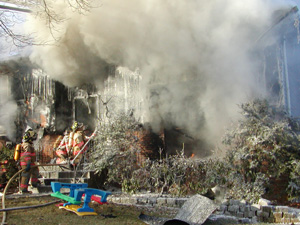
More danger can be found on the
Commack Fire Department's interesting website, which has pages of photographs chronicling gory vehicular accidents, strip malls on fire, and suburban homes burning, their vinyl siding transformed into dripping, molten plasm. And then, last month a guy I knew in junior high and HS, not a good friend, but someone I saw at concerts in the city and talked to every now and then, was beaten to death in a fight outside a strip club, located at the convergence of two commercial highways in my town--all it is is these convergences of commercial highways.
It's easy to bash on the suburbs, and I bet I've been doing it since prepuberty. But the truth is Commack LI NY and other
(supposedly) innocuous, typical whitebread suburbs are not such bad places to grow up. By definition they offer proximity to cities. Access is of course a problem, since getting there means you need money and a ride to the nearest station. But it's there. What makes a big difference is who raises you, who you know, and how hard you look for what you want. I was lucky to have a family that emphasized culture and exploration and made regular trips to NYC. At the same time, I grew up with kids that had never been to the city--cultural capital of the world and an hour away. It's also true that suburbs have their own regional particularities. Though there are plenty of similarities, my friends's towns in the Chicago suburbs are totally different from mine in terms of ethnicity and culture (I'm used to much larger representations of Italian and Jewish Americans. Both places are, horifically, plagued with racial segregation).
TAKOTRON loves the city life.

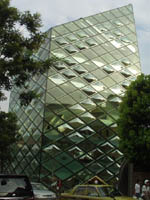 I love NY pizza and Chicago hot dogs, but Japan is the pinnacle of fast, efficient, wonderful food. We will also investigate some baseball, Kei's new baby cousin, and some buildings.
I love NY pizza and Chicago hot dogs, but Japan is the pinnacle of fast, efficient, wonderful food. We will also investigate some baseball, Kei's new baby cousin, and some buildings. 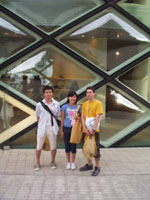 They will replace some iconic and well-liked apartments from the 50s, so it was a sensitive project. Down the street is the new Prada building, by the Swiss partners Herzog + DeMeuron. This was last year's novakids field trip highlight (lower right, with Kei and Yusuke). So you can hope for a field report within the next month. But no guarantees. More on Tod's Omotesando
They will replace some iconic and well-liked apartments from the 50s, so it was a sensitive project. Down the street is the new Prada building, by the Swiss partners Herzog + DeMeuron. This was last year's novakids field trip highlight (lower right, with Kei and Yusuke). So you can hope for a field report within the next month. But no guarantees. More on Tod's Omotesando
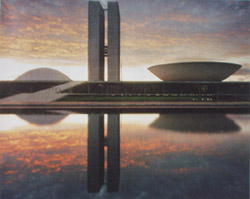
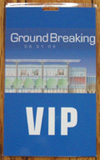 Since our last entry, Architecture Day in Chicago has come and gone. It was a'ight. You know TAKOTRON was V.I.P., cuz we're the CORPORATE SPONSOR of bold expression everywhere. So first up was the groundbreaking ceremony for the Art Institute's new North wing, which should be pretty cool, if they get the funding they need--twice what they have to reach their goal, and everyone knows these things can end up costing a lot more than the original estimate. Renzo Piano designed it, and the plan is to have a bridge leading from Millenium Park to a new entrance with a sculpture terrace on the second or third floor of the new wing. Piano explained that the bridge will be "straight, like a knife," forming a dialogue with Frank Gehry's serpentine titanium-paneled bridge over Columbus drive on the park's east side. The new-ish President and Director of the Art Institute, James Cuno, started off the morning with an optimistic speech on Chicago and the Museum's relationship with one another, and their collective place in the world, or something close to that. From what I've seen, he's intelligent and well spoken and a nice guy. He was followed by an appropriate recitation of an excerpt from Daniel Burnham's Plan of Chicago (1909) and then inevitible speeches by the museum's Board of Trustees and the CEO of JPMORGANCHASEBANKONE, the real corporate sponsor. Yay, mergers. I thought banks were supposed to exhibit an image of stability and permanence. Why do they always merge and buy eachother out, then, and end up with dumb names like JPMORGANCHASE and AMALGAMATED and FIFTHTHIRD? Throughout the whole thing, which involved no actual ground-breaking, the Redmoon Theater had these Spring Nymph people with painted white faces wandering around on stilts with watering cans, sprinkling petals around with branches stuck on their heads. What's up with theater?
Since our last entry, Architecture Day in Chicago has come and gone. It was a'ight. You know TAKOTRON was V.I.P., cuz we're the CORPORATE SPONSOR of bold expression everywhere. So first up was the groundbreaking ceremony for the Art Institute's new North wing, which should be pretty cool, if they get the funding they need--twice what they have to reach their goal, and everyone knows these things can end up costing a lot more than the original estimate. Renzo Piano designed it, and the plan is to have a bridge leading from Millenium Park to a new entrance with a sculpture terrace on the second or third floor of the new wing. Piano explained that the bridge will be "straight, like a knife," forming a dialogue with Frank Gehry's serpentine titanium-paneled bridge over Columbus drive on the park's east side. The new-ish President and Director of the Art Institute, James Cuno, started off the morning with an optimistic speech on Chicago and the Museum's relationship with one another, and their collective place in the world, or something close to that. From what I've seen, he's intelligent and well spoken and a nice guy. He was followed by an appropriate recitation of an excerpt from Daniel Burnham's Plan of Chicago (1909) and then inevitible speeches by the museum's Board of Trustees and the CEO of JPMORGANCHASEBANKONE, the real corporate sponsor. Yay, mergers. I thought banks were supposed to exhibit an image of stability and permanence. Why do they always merge and buy eachother out, then, and end up with dumb names like JPMORGANCHASE and AMALGAMATED and FIFTHTHIRD? Throughout the whole thing, which involved no actual ground-breaking, the Redmoon Theater had these Spring Nymph people with painted white faces wandering around on stilts with watering cans, sprinkling petals around with branches stuck on their heads. What's up with theater? 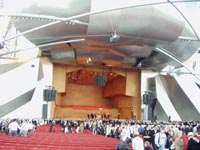
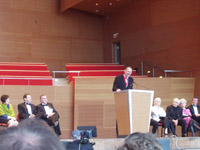 right:(l to r) Victoria Newhouse, architectural historian and author, founder and director of the Architectural History Foundation; Tom Pritzker; The Honorable Archduke Daley; Thom Mayne, at podium; woman in white, oops, forgot her naem; Frank Gehry; Ada Louise Huxtable, author and architecture critic of the Wall Street Journal; another person I forgot, but I think it's the architect Carlos Jimenez
right:(l to r) Victoria Newhouse, architectural historian and author, founder and director of the Architectural History Foundation; Tom Pritzker; The Honorable Archduke Daley; Thom Mayne, at podium; woman in white, oops, forgot her naem; Frank Gehry; Ada Louise Huxtable, author and architecture critic of the Wall Street Journal; another person I forgot, but I think it's the architect Carlos Jimenez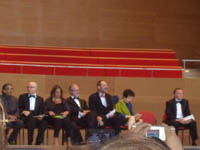 left:(l to r) Balkrishna Vithaldas Doshi, architect, sharp dresser, planner and professor of Architecture from Ahmeddabad, India; Rolf Fehlbaum, charman of the board of Vitra, Basil, Switzerland; Zaha Hadid, last year's Pritzker Laureate; Renzo Piano, 1998 Laureate; Thom Mayne; Victoria Newhouse; Mayor Daley, looking aloof
left:(l to r) Balkrishna Vithaldas Doshi, architect, sharp dresser, planner and professor of Architecture from Ahmeddabad, India; Rolf Fehlbaum, charman of the board of Vitra, Basil, Switzerland; Zaha Hadid, last year's Pritzker Laureate; Renzo Piano, 1998 Laureate; Thom Mayne; Victoria Newhouse; Mayor Daley, looking aloof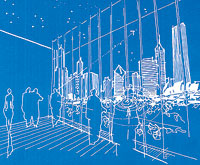 MAY 31 2005 CHICAGO, IL
MAY 31 2005 CHICAGO, IL A recent paternal visitation to Takotron HQ was characterized by a number of unsolicited comments by strangers on the physical resemblance between father and son. It also marked a continuation of good intergenerational, enlightening conversations. A recurring topic was suburbanism (my origin, immediate family's locale) and urbanism.
A recent paternal visitation to Takotron HQ was characterized by a number of unsolicited comments by strangers on the physical resemblance between father and son. It also marked a continuation of good intergenerational, enlightening conversations. A recurring topic was suburbanism (my origin, immediate family's locale) and urbanism.  More danger can be found on the
More danger can be found on the 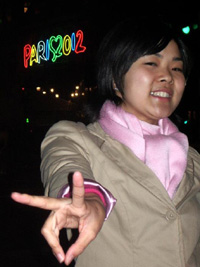 THENOVAKIDS RETURN Our experimental research abroad in cheese, romance, and Le Corbusier has come to a close (at least for one of us), and we are happy to report success on all fronts. I love Chevre (goat) cheese, though Takotron Kommander Keichan is not as big a fan. But the best cheese EVA in the universe is "Motin Charentais Fromage au Lait de Vache." You can get these amazing cheeses for just ~2?, which is just a little more than 2 weak little US $s. Then you put it on your amazing 80? baguette, whose price is regulated by the government, and you are eating affordably, amazingly, and authentically in Paris. You can also survive off of crepes, paninis, incredible falafel (introduced by semi-professional, semi-famous Parisian/World explorer
THENOVAKIDS RETURN Our experimental research abroad in cheese, romance, and Le Corbusier has come to a close (at least for one of us), and we are happy to report success on all fronts. I love Chevre (goat) cheese, though Takotron Kommander Keichan is not as big a fan. But the best cheese EVA in the universe is "Motin Charentais Fromage au Lait de Vache." You can get these amazing cheeses for just ~2?, which is just a little more than 2 weak little US $s. Then you put it on your amazing 80? baguette, whose price is regulated by the government, and you are eating affordably, amazingly, and authentically in Paris. You can also survive off of crepes, paninis, incredible falafel (introduced by semi-professional, semi-famous Parisian/World explorer 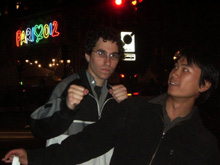 Paris has it's PARIS2012 campaign going in full effect. They have my vote. NYC, I love you, but you better STEP YO GAME UP! There's no way NY will get it, since they are proving to be too disorganized, fragmented, and bombastically overambitious to carry out two current grandes projets: the new WTC and a west side football stadium. Allow us to explain the phrase above borrowed from the French, which not one of those uneccesary foreign word insertions to make us look intellectual, like ouevre and wunderkammen. Although, those two words have specific, untranslatable meanings. Hmm. STEP YO FOREIGN LANGUAGE GAME UP, readers. Anyway, grandes projets is a term used for a number of major architectural undertakings commissioned by the national and Parisian governments, initially under former socialist president Francois Mitterand. Among them are I.M. Pei's Pyramids for the Louvre, The Centre Georges Pompidou (Piano + Rogers), La Grande Arche de la Defense (von Spreckelsen), and the Bibliotheque Nationale Francois Mitterand (Perrault).
Paris has it's PARIS2012 campaign going in full effect. They have my vote. NYC, I love you, but you better STEP YO GAME UP! There's no way NY will get it, since they are proving to be too disorganized, fragmented, and bombastically overambitious to carry out two current grandes projets: the new WTC and a west side football stadium. Allow us to explain the phrase above borrowed from the French, which not one of those uneccesary foreign word insertions to make us look intellectual, like ouevre and wunderkammen. Although, those two words have specific, untranslatable meanings. Hmm. STEP YO FOREIGN LANGUAGE GAME UP, readers. Anyway, grandes projets is a term used for a number of major architectural undertakings commissioned by the national and Parisian governments, initially under former socialist president Francois Mitterand. Among them are I.M. Pei's Pyramids for the Louvre, The Centre Georges Pompidou (Piano + Rogers), La Grande Arche de la Defense (von Spreckelsen), and the Bibliotheque Nationale Francois Mitterand (Perrault). 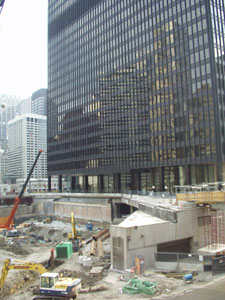
 So Trump, self-important asshole, fake-millionaire extraordinaire, is having built a bigass tower by the river here in Chicago. They're already clearing the site and maybe started digging for the foundation (left). It's gonna be yooge or whatever, a grand display of everyday nothingness. Included are "472 super-luxury condominiums from studios to three bedrooms and up to seven bedroom penthouses," and "90,450 square feet with exclusive boutique shopping and fine dining along the River." I am quoting from the official
So Trump, self-important asshole, fake-millionaire extraordinaire, is having built a bigass tower by the river here in Chicago. They're already clearing the site and maybe started digging for the foundation (left). It's gonna be yooge or whatever, a grand display of everyday nothingness. Included are "472 super-luxury condominiums from studios to three bedrooms and up to seven bedroom penthouses," and "90,450 square feet with exclusive boutique shopping and fine dining along the River." I am quoting from the official 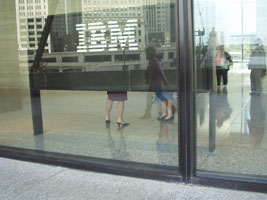 According to my copy of the AIA Guide to Chicago (2nd ed.), "Mies last American building, and his largest, follows his familiar model. It is sited so as to avoid obstructing Marina City and to capture the lake views made possible by a jog in the river" (52). Isn't that nice, how it purposefully avoids blocking Bertrand Goldberg's famous "corncob" towers? I hope you don't expect Donald to maintain that sort of reverence. No, looking at that picture I took from his little website (
According to my copy of the AIA Guide to Chicago (2nd ed.), "Mies last American building, and his largest, follows his familiar model. It is sited so as to avoid obstructing Marina City and to capture the lake views made possible by a jog in the river" (52). Isn't that nice, how it purposefully avoids blocking Bertrand Goldberg's famous "corncob" towers? I hope you don't expect Donald to maintain that sort of reverence. No, looking at that picture I took from his little website (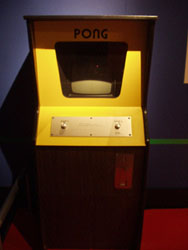
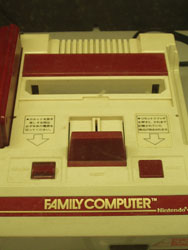 Ongoing through Sept. 5, 2005 (I think) at Chicago's Museum of Science and Industry is the travelling exhibit, Game On, a historical retrospective of video games.
Ongoing through Sept. 5, 2005 (I think) at Chicago's Museum of Science and Industry is the travelling exhibit, Game On, a historical retrospective of video games. 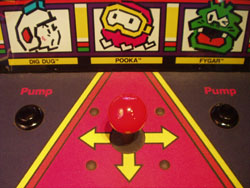 A couple complaints: the graphic design around the exhibit is pretty annoying, but I guess it's supposed to be for the kids (who probably don't really care). A lot of the exhibits at the Science and Industry have these overblown spectaclist installations that obscure the content. Lame. Also, I read that in Europe they had some more violent games like Mortal Kombat that they dropped for the Chicago presentation. In fact, no "M"-rated games. LAME!. Can't I just bust out the MK BLOOD CODE for Genesis: A-B-A-C-A-B-B? My right thumb will remember forever. I will take the BLOOD CODE to the grave.
A couple complaints: the graphic design around the exhibit is pretty annoying, but I guess it's supposed to be for the kids (who probably don't really care). A lot of the exhibits at the Science and Industry have these overblown spectaclist installations that obscure the content. Lame. Also, I read that in Europe they had some more violent games like Mortal Kombat that they dropped for the Chicago presentation. In fact, no "M"-rated games. LAME!. Can't I just bust out the MK BLOOD CODE for Genesis: A-B-A-C-A-B-B? My right thumb will remember forever. I will take the BLOOD CODE to the grave. 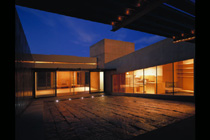 Today architect Antoine Predock gave a lecture at the Art Institute of Chicago organized by the museum's Architecture and Design Society. And TAKOTRON was there. The architect spoke mostly of his more recent projects, including two proposals that recently won their respective competitions: The National Palace Museum in Taipei, Taiwan (below), and The Canadian Museum for Human Rights in Winnepeg.
Today architect Antoine Predock gave a lecture at the Art Institute of Chicago organized by the museum's Architecture and Design Society. And TAKOTRON was there. The architect spoke mostly of his more recent projects, including two proposals that recently won their respective competitions: The National Palace Museum in Taipei, Taiwan (below), and The Canadian Museum for Human Rights in Winnepeg.  Predock accepts the Critical Regionalist label to a degree, but is careful not to be confined by it. He reponds to the idea, "yeah, but it's portable." The National Palace Museum in Taiwan indirectly references a plethora of cultural symbols and ideas, including the distant peak of "Jade Mountain," early scroll paintings depicting rivers and mountains, and lanterns, as well as borrowed "pan-asian" examples, especially for the surrounding gardens. It is approached from two opposite paths that bridge a surrounding canal. The paths are to remain open after hours, so that pedestrians can travel through the space without actually entering the building. The museum is to house some 650,000 treasures secretely salvaged from mainland China's Forbidden City by Chiang Kai-shek, in addition to contemporary artwork and performance spaces and increasing collections of pieces from other Asian countries.
Predock accepts the Critical Regionalist label to a degree, but is careful not to be confined by it. He reponds to the idea, "yeah, but it's portable." The National Palace Museum in Taiwan indirectly references a plethora of cultural symbols and ideas, including the distant peak of "Jade Mountain," early scroll paintings depicting rivers and mountains, and lanterns, as well as borrowed "pan-asian" examples, especially for the surrounding gardens. It is approached from two opposite paths that bridge a surrounding canal. The paths are to remain open after hours, so that pedestrians can travel through the space without actually entering the building. The museum is to house some 650,000 treasures secretely salvaged from mainland China's Forbidden City by Chiang Kai-shek, in addition to contemporary artwork and performance spaces and increasing collections of pieces from other Asian countries. Today the takotron staff will teach you how to clean your records a.k.a. LPs in an easy and effective manner. Our motives remain confidential.
Today the takotron staff will teach you how to clean your records a.k.a. LPs in an easy and effective manner. Our motives remain confidential. 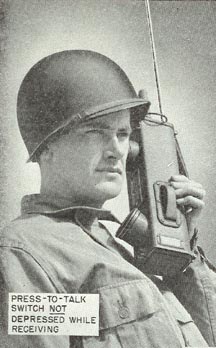 Next time you're on the phone trying to read your account number or spell your name to some tired customer service representative, and you get to one of those ambiguous tonalities like "V" or "M," you should refer to the follwing rather than emabarrass yourself by exposing your repugnant subconscious or just saying 'uhh...' for a while as only vulgar anatomical terms come to mind. Plus, you'll need this if you end up in that post-apocalytic concrete bunker with nothing but your short-wave and some canned beans.
Next time you're on the phone trying to read your account number or spell your name to some tired customer service representative, and you get to one of those ambiguous tonalities like "V" or "M," you should refer to the follwing rather than emabarrass yourself by exposing your repugnant subconscious or just saying 'uhh...' for a while as only vulgar anatomical terms come to mind. Plus, you'll need this if you end up in that post-apocalytic concrete bunker with nothing but your short-wave and some canned beans.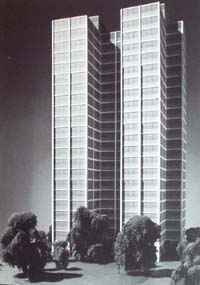 Here is a photo of that model of Mies' original steel design for the Promontory Point Apartments. It looks like this is looking from the west, towards the lake. Lets listen to the song (source:
Here is a photo of that model of Mies' original steel design for the Promontory Point Apartments. It looks like this is looking from the west, towards the lake. Lets listen to the song (source: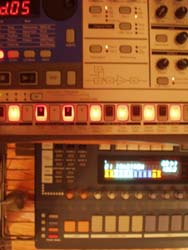 New release:
New release: 